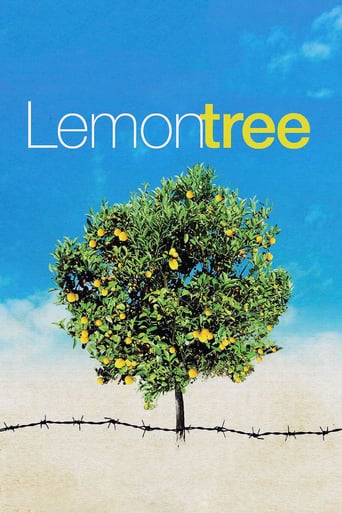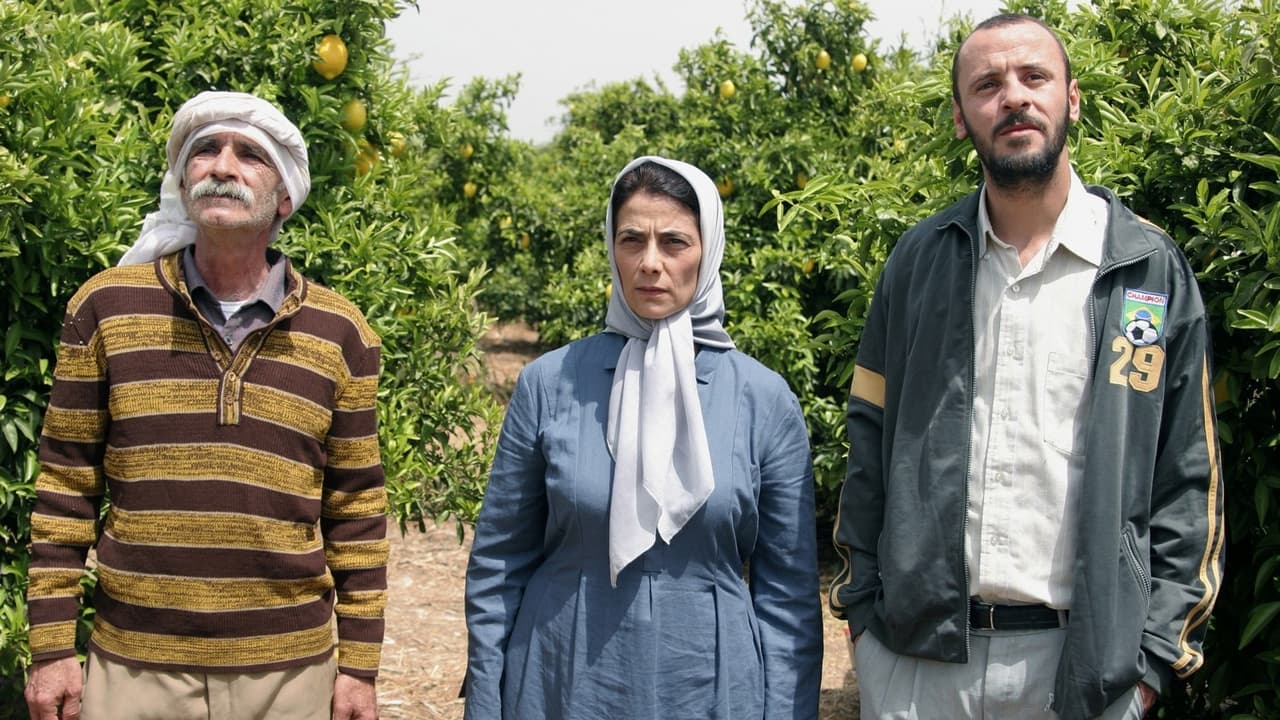johnnyboyz
"Lemon Tree" is not a particularly political film, but its roots lie in a deeply divisive and inherently political issue. Its overall attitude to the seemingly perpetual conflict between Jews and Arabs on the Sinai Peninsula seems to be to poke fun at it, even point out the absurd nature of it and the ridiculous conclusions people involved in it reach - such as the rather far-fetched belief that a small orchard might be used as the means for an armed assault on a premises housing someone important. Its second of two agendas is to remark that, ultimately, the conflict is one being fought between two sets of human-beings, all of whom are flesh and blood and as flawed in their thinking and attitudes as the rest of us. It does not seem coincidental that the film's opening shot is that of a large knife dividing into two halves a lemon, for here is a film about a problem to do with binaries; segments and redistribution. Cutting the lemon is Hiam Abbass' middle-aged Arabian woman Salma Zidane, somebody who is living in the West Bank and runs an orchard housing the eponymous lemon trees which has been in her family for decades. She grew up tending the trees with her father, but with him deceased and her children off and away studying in America, she relies on the elderly Abu Hussam (Tarik Copti) to help her harvest and maintain the plot. On the other side of the orchard is, quite literally, the nation of Israel.From nowhere, the very real situation that has engulfed her geographical area since the forging of a Jewish state in Western Asia lands directly on her doorstep: none other than the Israeli Defence Minister, played by Doron Tavory, moves into the villa on the plot immediately next door to her land. In a flash, lookout towers go up; fences are erected and guards armed to the teeth patrol the perimeter. Director Eran Riklis utilises here the harsh juxtaposition of the harmless, aging fruit pickers of Salma and Abu going about their business with the extreme militarism of the new neighbours for what I assume to be comedic effect - the statement is subtle, but effective, in what is a difficult situation to get across a political point without appearing reactionary.To Abu and Salma's horror, the Minister's paranoia about being exposed to some sort of attack by Israel's enemies extends so far that he places an executive order to have the orchard torn down... His reckoning being that the collection of trees might act as fantastic cover for a group of soldiers or militants to surprise the Israeli during some kind of siege of the villa. Not content to take this as it stands, Salma decides to drag the decision through the judicial system - stopping at nothing to keep her lemon trees.From here, one is able to reach a glut of conclusions about the film and enjoy it in a variety of different ways. The most basic of readings is to enjoy it as little more than a procedural legal thriller, where somebody of some power has done something which victimises somebody else and that said victim must fight their way through the courts for an unlikely victory. This in itself brings about an array of problems, issues no less pertaining to legal costs; mind numbing levels of mostly unresponsive bureaucracy on the judiciaries' end and the sheer emotional toil. "Lemon Tree" reminded me, in this respect, of an old Senegalese film you will not have seen entitled "Certificate of Indigence", where a woman largely on her own wades through the system to seemingly obtain a basic right to even be acknowledged. Alternatively, the film is a love story: the lawyer Salma hires, Ziad (Ali Suliman), to work with her throughout the case eventually comes to fall in love with her - the fact he is already married complicates matters further. "Lemon Tree" might also be read into as a feminist piece - a mousy, and otherwise defenceless, woman seeks a victory over a patriarchal figure. Lastly, it might be 'enjoyed' as either pro-Palestinian - where the Israelis are bullies and the Arabs victims - or inherently Zionist, where the last bastion of the homeland of the Jewish people's minister for defending that land is merely taking the rightful precaution for his survival. Does he not have a point about the orchard in the first place? Director Eran Riklis, who is Israeli born, manages to find a film-making 'place' which depicts Israelis as both shallow reactionaries and bullies, but also, in the form of the Minister's wife, sympathisers of the poor Arab woman next door who is about to lose her beloved trees. Scenes involving the two often humanise them, meaning the Jews' role in the film is not to fulfil the role of the stock Zionist oppressor/villain. An Arab, for sure, is the victim in the film, but we are somehow able to sympathise with Salma in her plight without being anti-Semites - her lawyer, the aforementioned Ziad is presented as a deviant in one respect as he would quite easily have gone behind his existing wife's back had Salma not rejected his advances. However one views "Lemon Tree", one ought to be able to enjoy it.
SnoopyStyle
Salma Zidane is a widow scrapping by a living from her grove of lemon trees in the West Bank that was inherited from her father. The Israeli Defense Minister Navon and his wife move in next door. The Secret Service wants to cut down the trees but Salma resists. She gets young lawyer Ziad Daud to take the case. Mrs. Navon is sympathetic but the military bureaucracy marches on. It becomes a media cause as the case rises to the Supreme Court.This is an anti-wall movie. The two female leads are very compelling. There are missing scenes that would have propelled this to the next level. The movie is building up to a meeting between the ladies but the security guard stops Mrs. Navon. That would have been a very compelling scene but the movie choose to go another way. There is also a bombing but the movie chooses not to show it. I would rather not have a bombing at all. These two women are great characters and this is an almost great movie.
Linda
This film is rich in irony. It presents a microcosm of Israeli-Palestinian relations that go nowhere and lack empathy, but create torment for both sides. The Israeli Defense Minister and his wife (the Navons) move into a large, modern home at the Green Line, the border of the West Bank of the Jordan River to the east. Their neighbor is a middle-aged widow (Salma Zidane) who lives alone in a stone house and tends a lemon grove she inherited from her father from which she ekes a modest income. She is assisted by an elderly man who has worked for the family for 50 years. The defense minister's nervous security chief draws down on the two of them as they walk through the grove and surprise him. They never give each other more than uninterested glances. The defense minister accepts the advice that the grove must be cut down for security purposes.The widow receives notice written in Hebrew from a Hebrew-speaking soldier. She does not speak the language and goes to a town elder to translate, invading the all-male sanctum of a social hall. Although the letter offers the possibility of compensation, the elder warns her that her people do not ask the occupying Israelis for it. Soon the grove is fenced in and posted. When she sees the trees turning brown from lack of water and lemons spoiling on the ground, Salma climbs the fence in the long dress to care for the trees. She panics even the distracted soldier in the watch tower who spends time in the tower listening to tapes with inane sample questions to prepare for a logic test. He speaks Arabic, so they can converse.Salma finds a Palestinian attorney in town in a shabby office to take her appeal of the taking of her grove to Israeli court. His name is Daud and like the David of the Jewish Bible, he agrees to take on the giant. He doesn't ask for a fee. The minister's wife (Mira Navon) observes the widow several times. Their eyes meet, but they never greet. They wouldn't likely be able to speak a common language if they did and learn that they each have a child living in Washington DC whom they call. They are close in age and similar in appearance, tall and slim with long, brown hair. One dresses in pants suits, the other in dark long skirts and head covering in front of men. Mira asks her husband to dissolve the order to rescind the order to cut down the grove. He says he will rely on the decision of the Israeli security service. When the Navons throw a big housewarming party, they serve catered Mideastern food, taking care it is kosher for their politically connected orthodox guests. When they realize the caterer did not include an important item, lemons, they send a couple of soldiers to collect some from the fenced grove. When Salma sees them, she climbs the fence again and physically struggles with the soldiers, falling to the ground and being dragged briefly until the minister orders the soldiers to stop. The minister's wife apologizes in Hebrew, her first spoken words. The party is interrupted by gunshots coming from the grove. Armed soldiers search the widow's house for terrorists and leave its contents in shambles after they don't find anyone. Meanwhile their conflict attracts local, then international, news. The grove owner loses in the military court. She wants to appeal to the Israeli Supreme Court in Jerusalem. In the end the solution is not satisfactory to either side, not an uncommon result in litigation. Could the Israeli defense minister and the grove owner found a way to resolve their concerns in a mutually agreeable way? Probably if they had tried to talk. Both sides were defiant. Will their respective peoples be able to resolve their disputes and live in peace and cooperation for a better life? The film does not give as hope, but shows the need.
Red-125
Etz Limon (2008) directed by Eran Riklis, was shown in the United States with the title "Lemon Tree." (Don't confuse the film with a popular novel that has the same title.) The plot of the story is simple enough. The Israeli defense minister moves into a home located right next to a lemon grove owned by a Palestinian woman. Israeli security agents decide that the grove presents a hazard to the minister and his wife, and declare that the lemon trees must be destroyed. The Palestinian woman fights the destruction of her livelihood and her legacy.Although the basic plot of "Lemon Tree" is simple, the movie is complex. There are fascinating interactions between the woman--Salma Zidane, played by the incomparable Hiam Abbass--and her lawyer and her children. The defense minister has a edgy relationship with his wife. (His wife is basically a fair and caring woman, and isn't supportive of the grove's destruction, but she also likes being married to a powerful, charismatic public figure.) The defense minister is obviously very close to a beautiful young aide, and the movie suggests that they're having an affair.Although the film is clearly sympathetic to the Palestinian cause, all of the Palestinians aren't portrayed as perfect individuals. One local Palestinian leader doesn't suggest any course of action for Salma, but warns her not to accept compensation from the Israelis. Refusal to accept compensation probably makes sense as a political strategy. However, without compensation, what options are open to a widow whose sole livelihood is taken from her?To me, the saddest part of the movie was the failure of Salma and the minister's wife Mira (Rona Lipaz-Michael) to ever meet face to face. On several occasions in the film they almost meet, but the meeting never actually takes place. Symbolically, that failure to communicate on a personal level represents the Israeli-Palestinian dilemma. They are figuratively and literally unable to speak to each other, and therefore they can never move beyond stereotypes and hostility.We saw this film at the excellent Rochester Jewish Film Festival. However, it would work well on the small screen. It's an extraordinary film, and definitely worth seeking out.



 AD
AD





